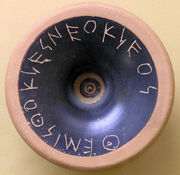| ||||||||||||||||||||||||||
Themistocles (c. 524–459 BC), was an Athenian politician and general. He was one of a new breed of politicians who rose to prominence in the early years of the Athenian democracy, along with his great rival Aristides. He was a populist, riding on the support of the lower classes.
In the years after Marathon, and in the run up to the second Persian invasion Themistocles became the most prominent politician in Athens. He continued to advocate a strong Athenian navy. In 483 BC, a massive new seam of silver was found in the Athenian mines at Laurium. Themistocles proposed that the silver should be used to build a new fleet of 200 triremes, whilst Aristides suggested it should instead be distributed amongst the Athenian citizens. Themistocles's motion was carried but Aristides refused to countenance this. Tension between the two camps built over the winter, so that the ostracism of 482 BC became a direct contest between Themistocles and Aristides. In what has been characterized as the first referendum, Aristides was ostracized, and Themistocles' policies were endorsed.
Athenians, becoming aware of the Persian preparations for the coming invasion, voted for the construction of more ships than Themistocles had initially asked for. These would prove crucial in the forthcoming conflict with Persia. During the second invasion, he was in effective command of the Greek allied navy at the battles of Artemisium and Salamis. Due to subterfuge on the part of Themistocles, the Allies lured the Persian fleet into the Straits of Salamis, and the decisive Greek victory there was the turning point in the invasion, which was ended the following year by the defeat of the Persians at the Battle of Plataea.
After the conflict ended, Themistocles continued to be pre-eminent amongst Athenian politicians. However, he aroused the hostility of Sparta by ordering Athens to be re-fortified, and his perceived arrogance began to alienate him from the Athenians. In 472 or 471 BC, he was ostracized, and went into exile in Argos. The Spartans now saw an opportunity to destroy Themistocles, and implicated him in the treasonous plot of their own general Pausanias. Themistocles thus fled from Greece, and travelled to Asia Minor, where he entered the service of the Persian king Artaxerxes I. He was made governor of Magnesia, and lived there until he died in 459 BC, probably of natural causes.
Themistocles in "Counting Potsherds"[]

One of the potsherds Mithredath found, bearing the name of Themistokles.
Themistokles was a leader in the Athenian democracy, prior to Persia's conquest of Athens. Centuries later, Mithredath found 92 potsherds with Themistokles' name on them in the wilderness Athens had become.[1]
Shortly after, Mithredath's servant Raga found a large flat stone with extensive lettering on it in the Royal Portico. It listed a series of names of Athenians exiled, at most one per year. Three years before the conquest of Yauna (482 BC), Themistocles had been exiled, thus showing it could be done by counting potsherds. Two subsequent years were blank indicating no one had been exiled and then listed "Xerxes, son of Dareios", a gesture of defiance against Khsrish I the Conqueror.[2]
References[]
- ↑ See, e.g. Departures, pgs. 19-21, pb.
- ↑ Ibid. pgs. 23-24.
| Political offices (OTL) | ||
|---|---|---|
| Preceded by Pythocritus |
Archon of Athens 493-492 BC |
Succeeded by Diognetus |
| |||||
